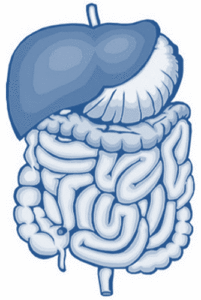Until recently, I’d never heard of small intestinal bacterial overgrowth (SIBO, pronounced see-bow). Family and friends brought it to my attention after they’d experienced nausea, bloating, diarrhea, and the like. Their physicians attributed these symptoms to excessive bacterial growth in their small intestines. They received treatment with antibiotics along with recommended changes to their diets. Unfortunately, some of them found no relief.
I received an invitation to a nutritionfacts.org webinar entitled SIBO and Leaky Gut: What the Science Says and decided to attend. As noted in an earlier blog, I’ve developed a high degree of confidence in this website based on their mission and research methodology. Here’s what I learned from their latest webinar:
 Physicians typically use a breath test to determine whether or not someone has bacterial overgrowth in the small intestine. Such tests may not reliably detect the presence of excess bacterial overgrowth. They may detect false positives.
Physicians typically use a breath test to determine whether or not someone has bacterial overgrowth in the small intestine. Such tests may not reliably detect the presence of excess bacterial overgrowth. They may detect false positives.- Even if we could accurately diagnose SIBO, there has been no reported difference in symptoms among those who test positive and those who test negative.
- When patients are treated with antibiotics, their good bugs get wiped out with the bad ones. With competition thus removed, antibiotic resistant (bad) strains of bacteria can get the upper hand, which can compound physical trauma. Moreover, some people experience unpleasant side effects from the antibiotics themselves.
- SIBO may not be the causal agent in gastrointestinal (GI) distress. Upwards of 44% of the population have been found to be lactose intolerant. If dairy consumption triggers symptoms, antibiotics will not provide relief.
Dr. Michael Greger suggests that it’s not bacterial overgrowth that creates the problem but the type of bacteria that takes root in the intestine. In particular, when our daily diet consists of low fiber, high sugar foods, we lose the good bacteria that produce short chain fatty acids with which we keep our gut linings good and tight. Substances that should be contained in our guts start to leak into our bloodstreams causing an inflammatory response. When we take aspirin or ibuprofen to relieve symptoms, we increase the GI barrier dysfunction (a.k.a. leaky gut). By contrast, when we cut out the sugar and eat high fiber foods (e.g., whole grains, legumes), we feed the good gut bacteria, produce the requisite short chain fatty acids, and tighten up our gut lining.
Unfortunately, the average adult eats on 15-16 grams of fiber per day. That number needs to top 50 grams per day using whole foods. It cannot be corrected with psyllium supplementation. Those products help with constipation, but they don’t provide the nourishment for good gut bacteria. We should also minimize (or eliminate) alcohol consumption and saturated fats as both contribute to bad bacteria growth and, hence, leaky gut.
If you are not used to eating whole grains and beans, the dietary change can cause a little GI distress. No worries! Simply work you way up to several servings per day a little at a time. Your body (and your gut) will adapt to the change. It’s not a race to the finish line. It’s a commitment to eating healthfully for a lifetime.
Are you among the 1 in ~50 folks who has a problem with gluten (i.e., wheat allergy, celiac disease, non-celiac gluten sensitivity)? No worries! There are plenty of gluten-free whole grains. Or, you could increase your consumption of legumes along with fresh fruits and vegetables.
To see the SIBO videos, subscribe to nutritionfacts.org. They’ll be published on-line in the coming weeks.